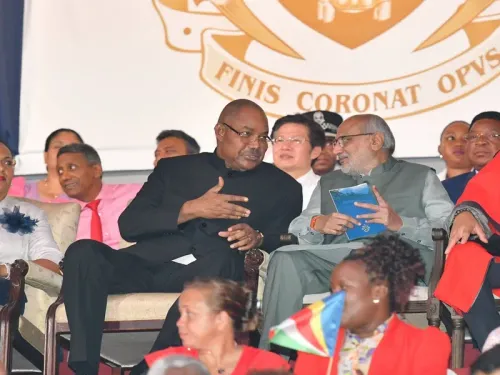RS MP Satnam Singh Sandhu Commends Union Budget 2025-26 as a ‘People’s Budget’

Synopsis
Key Takeaways
- Union Budget 2025-26 is termed a 'people’s budget' by Satnam Singh Sandhu.
- Allocation of Rs 1.28 lakh crore for education sector, aiming for 50% Gross Enrolment Ratio by 2035.
- Atal Tinkering Labs to be established in 50,000 schools.
- 10,000 new medical college seats proposed for next year.
- Support for gig workers under Ayushman Bharat scheme.
New Delhi/Chandigarh, Feb 1 (NationPress) Rajya Sabha MP and Chandigarh University Chancellor Satnam Singh Sandhu on Saturday praised the Union Budget 2025-26 as a 'people’s budget' and characterized it as a significant milestone in the nation’s progress toward comprehensive development, realizing the aspirations of every citizen.
“This budget not only caters to the immediate requirements of the country but also lays the groundwork for the future with initiatives for startups, such as the Deep Tech Fund, Geospatial Mission, and Nuclear Energy Mission. Numerous sectors have been opened up for the youth, and the common citizen will spearhead the mission of Viksit Bharat. This budget acts as a force multiplier, enhancing savings, investment, consumption, and growth,” stated the Parliamentarian.
He welcomed the allocation of Rs 1.28 lakh crore for the education sector, reflecting a 6.65 percent increase from the previous year, saying, “This will improve the quality of education, foster research and innovation, and broaden access to higher education opportunities for all. This is a crucial step towards achieving a 50 percent Gross Enrolment Ratio in higher education by 2035.”
Sandhu also applauded the government's initiative to set up Atal Tinkering Labs in 50,000 government schools over the next five years, asserting that this will cultivate creativity and problem-solving skills among students. He mentioned that these labs would bolster India’s ambition to excel in science and technology.
“Furthermore, the BharatNet scheme will guarantee broadband access to all government secondary schools and primary healthcare centers in rural regions, enhancing opportunities for online education and telemedicine services,” Sandhu added.
He further stressed, “To narrow the divide between education and industry demands, the Union Budget proposes the establishment of five National Centres of Excellence for Skilling; these centres will collaborate with international institutions and industry leaders to prepare students for careers in high-demand sectors. In response to the growing significance of artificial intelligence in education, a Centre of Excellence in Artificial Intelligence for Education will be created with a budget of Rs 500 crore.”
Additionally, he embraced the government's goal to introduce 10,000 medical college seats in the upcoming year, aiming for a long-term target of 75,000 additional seats over the next five years. He noted that engineering colleges, including some IITs, will experience significant infrastructure enhancements, allowing for an expansion of 6,500 extra seats, which will assist in mitigating the brain drain by providing quality education within India.
Sandhu commended the Modi administration for broadening healthcare coverage to gig workers under the Ayushman Bharat Pradhan Mantri Jan Arogya Yojana (AB-PMJAY).
“Gig workers from online platforms such as Blinkit, Zepto, and Swiggy Instamart will obtain identity cards and registration on the e-Shram portal, granting them healthcare benefits under the PM Jan Arogya Yojana. This initiative will assist one crore gig workers employed in 10-minute grocery delivery services,” he remarked.
The Rajya Sabha MP concluded by saying that the government's initiative to bolster startups with a new Rs 10,000 crore fund of funds (FoF) will further enhance India's startup ecosystem, stimulate innovation, and contribute to job creation and economic growth.









